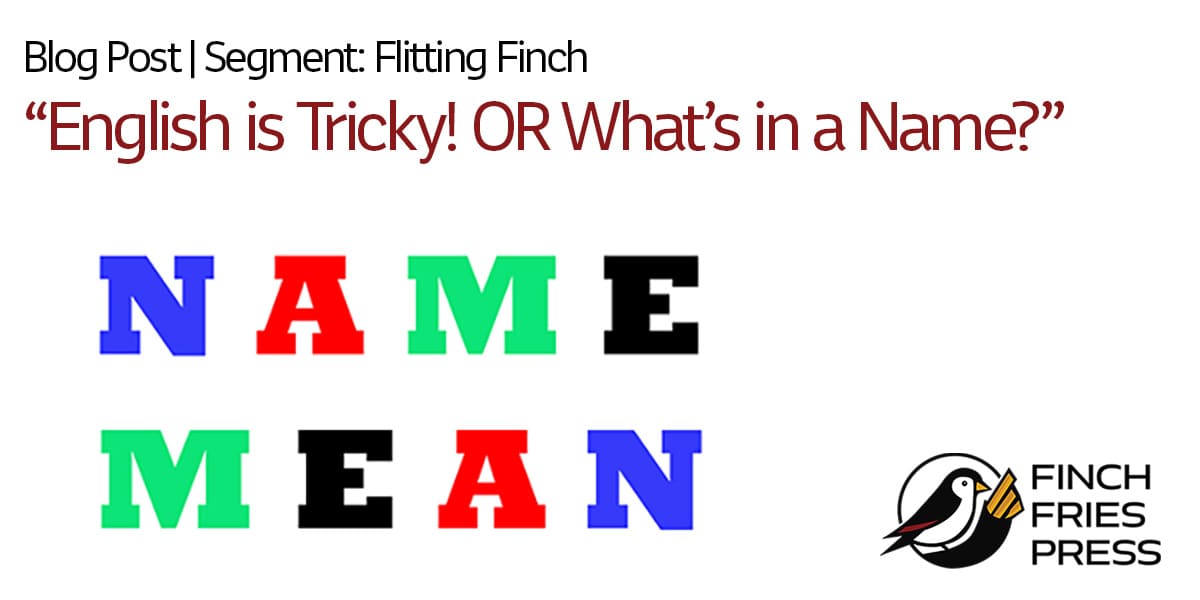Whether writing or just living life, I enjoy a little wordplay.
A few days ago, for instance, one of those notions that occasionally floats into my conscious thoughts blipped on my radar. The thought was: Sometimes English almost behaves like a tonal language. [A Finchly Flit: If you’re still hung up on whether that was a mixed metaphor one sentence back, know that I appreciate such pedantry.]
For those of you that haven’t had the pleasure, tonal languages pack a lot of meaning into slight pronunciation differences. For example, in Mandarin, “ma” has a different meaning for each of the four tones ("mother," "hemp," "horse," and "scold"). [Another Finchly Flit: Closer to home for me... Navajo is also a tonal language, but I haven't had the opportunity to study it yet. One day!]
While this doesn’t exactly occur in English, some regional American English dialects do differentiate words in a similarly picky way. We have words that change between noun and verb depending on where we place the emphasis (PRO-gress for the thing and pro-GRESS for the action) and words with different meanings that, really, are barely different words at all (“caught” versus “cot” and “super” versus “supper,” the latter of which consternated an old acquaintance of mine).
Anyway… I admit to being very interested in applied linguistics at one point in my life (an affliction that sometimes resurfaces). However, that’s not really what this post is about.
English pronunciation isn’t the only part of my mother tongue that’s a little finicky. Take the name of my book series, Raiders of Light. Are they Raiders OF LIGHT, in the sense that they’re made of light or aligned with it? Or are they RAIDERS of light, in the sense that they’ve committed some kind of theft against the light? Or perhaps some combination? Who ARE they?
For that to be answered in its entirety, I guess the reader will have to wait and see.
Similarly, consider the title of Light’s Shadow. Does it refer to the looming presence of the Lightborne, the refuge of the Abzu and Infra, or to the Darktouched themselves (who are in their own way a shadowy remnant of subverted light)? Perhaps the answer is all of these or none. I’ll leave this question to the audience to decide.
Finally, when naming characters, I wanted to embed subtle meaning and allusions into the story. Below are some examples:
- Lucas. If derived from Latin, this name means “bringer of light.” How very literal of me…
- Devlin. An Irish surname; Anglicized form of Gaelic Ó Dobhailéin 'descendant of Dobhailéan', a personal name probably from a diminutive of dobhail (meaning "unlucky" or "unfortunate").
- Corynna. The name Korinna is a feminine name of Greek origin that means "maiden" or "young woman.” It comes from the Greek word korē, which was also the original name of Persephone, the goddess of spring. Those who have heard Kilk’s harrowing tale of his journey through the depths of Branthumville will know why this connection has importance.
- Corynna was to me similar enough to the name Corvin, which means “raven” and reflects a prominent character and theme in the novel.
- Corynna also aligns closely to the name Corin, who was a character in Shakespeare’s comedy As You Like It, which the reader may remember spurred Lucas to choose Arden as his Darkname.
Almost every name used in Light’s Shadow has some connection to a real place, a literary work, a god or goddess in some ancient mythology, or a major theme of the story. Some of them are easily spotted, while others—like the children of Tiamat hiding in the Deep Infra—are much more difficult to uncover.
Can you find other examples? What meaning do you think this holds for the story?
Good luck with your search!
